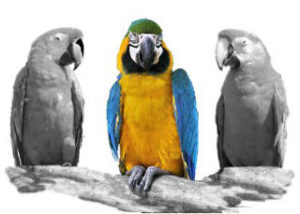The truth about public speaking anxiety is not what they tell you. In 20 years, I have never once read the truth anywhere, and yet when I tell you, it will seem so obvious that you’ll wonder why you haven’t heard it before.
The metaphor
You hear some rustling outside, so naturally you step out of your tent and into the African savannah. You are surrounded by hundreds of miles of knee to waist-high grass interspersed with prickly Acacia trees and Baobab trees. As the dust settles, and the intense sun rays shine through, you realize, a pride of felines circles your position.
The lioness is the predator, and you are the prey.
The matriarch weighs well over 200 pounds, her roar is heard almost 5 miles away, and as she holds up her 1.5 inch claws, she also brandishes 2.5 inch teeth.
The lioness is the predator, and you are the prey.
The anxiety
Your autonomous nervous system takes control over your body. Hello adrenaline. Your heart and breathing rate accelerate instantly. Your digestive system immediately shuts down, your mouth becomes dry and your eyes dilate. All of that blood is quickly redirected to your muscles. Your face flushes with blood, and your muscles begin to shake in preparation for your next move. Your bladder relaxes, your hearing dissipates, and tunnel vision sets in.
You have almost no control over it. It’s automatic. Before you know it you are either fighting the lion, or running away.
The Reality
 Except you are not actually in the African Savannah. You have not stepped out of your tent into a pride of lions, you have stepped up on stage in front of a proud audience, hungry for what you have to feed them.
Except you are not actually in the African Savannah. You have not stepped out of your tent into a pride of lions, you have stepped up on stage in front of a proud audience, hungry for what you have to feed them.
The audience is the predator, and you feel like prey.
Conventional advice doesn’t work
What advice have you heard to remedy the fear? I don’t care how much you search the internet, you’re going to find the same old advice:
- Take deep breaths
- Practice
- Think positive
- Your audience wants you to succeed
- Exercise
- Relax
- Slow Down
- Meditate
We could go on and on. My point is this: everything I have ever read on this subject is total baloney!
Okay, I exaggerate a little. This advice is not totally worthless. Conventional advice can lesson some of the symptoms temporarily; it just does nothing to cure the disease.
Do you know what it feels like?
The first time I spoke in public, an anxiety attack almost sent me into a life hiding from the spotlight. Real anxiety can affect you before, during, and even for hours after you speak. If you are a person who actually knows what it feels like, you know that a few breathing exercises don’t make it go away.
It’s almost like all those people giving advice, don’t actually know what it really feels like for you.
Does it work?
Are breathing exercises really going to help when the lion queen pounces?
Is slowing down going to help you get away?
Are positive affirmations going to magically scare the lioness backwards?
NO!
If conventional advice wouldn’t work in front of a pride of real lions, why on earth would anyone expect it to work in front of a proud audience?
Your physical problem is the same. The physical symptoms are the same. The biological reaction is the same. Why should your solutions be different?
They wouldn’t! All of that advice is wrong!
You Blend In
 When you’re behind the bars, or behind the glass at the zoo, you’re in control. Behind the glass, you can easily blend in with the make-shift savannah. You can easily blend in with other zoo patrons. You can easily blend in with the lions–as if it’s normal for you both to be in close proximity.
When you’re behind the bars, or behind the glass at the zoo, you’re in control. Behind the glass, you can easily blend in with the make-shift savannah. You can easily blend in with other zoo patrons. You can easily blend in with the lions–as if it’s normal for you both to be in close proximity.
You Stand out
But when there is the slightest crack in the glass, you suddenly stand out. Suddenly, when the glass breaks, you feel like the center of attention. The lioness becomes the predator and you become the prey. You stand out.
The problem
This is the problem: You can’t stand out and blend in at the same time. When you’re facing a pride of hungry lions, you want to blend in, but when the glass breaks you have to stand out! That disconnect turns on the anxiety.
You can’t stand out and blend in at the same time.
Conventional Advice = Blending In

If you are feeling anxiety when they shine the spotlight on you, it is because you are trying to blend in. And you can’t blend in and stand out at the same time.
Do you remember the last time you felt those nerves? What did you do?
You tried to take deep breaths. You tried to slow down. You tried to relax. You tried to do exactly what they tell you to do. ALL of that advice is designed to help you blend in, to help you feel more comfortable, and to help you feel like you belong.
It might work for a little while. If you succeed at blending in with the Savannah, you may feel slightly more relaxed, temporarily. But masking the symptoms will never eradicate the disease.
Your feeling like you blend in doesn’t change the fact that the lion sees you standing out.
If the problem is broken glass, the solution is not breathing exercises. If the problem is broken glass, the solution is to replace the glass.
You must stand out
You cannot stand out and blend in at the same time.
You have to choose one.
Option 1: Refuse to speak
If you insist on blending in, staying one of the crowd, and not making any waves, then you can only avoid the anxiety by rejecting the spotlight.
The first time I spoke in public my anxiety attack was so bad that I replayed the experience in my mind for days. I second guessed myself constantly and swore silently to myself for months “If anyone ever asks me to speak in public again, I’m going to say no!”
Option 2: Embrace the spotlight
Then I realized there was another alternative. I realized that at some points in life, you get thrust into the spotlight whether you like it or not.
Someday the glass will break, and you will stand out. When you’re already on stage, it’s too late. When you are the speaker, you always stand out.
If you can’t stand out and blend in at the same time, and you have no choice but to stand out, then it’s a waste of time to try blending in.
The only choice to avoid the anxiety is to embrace the spotlight. I decided to learn to stand out on purpose. Because of that decision, my speaking career was born, and my greatest weakness has been transformed into my most passionate strength.
How to survive a lion attack
By the way, do you know what you’re supposed to do when threatened by a lion in real life?
You embrace the spotlight. You stand out. The experts say you stand up tall, you wave your arms. You make yourself look bigger, taller, stronger, louder. When you stand out successfully, the lion backs down.
Don’t Blend in, Stand out
 The solution to speaking anxiety is not easy, but it is simple. Don’t blend in, stand out. The 7 SpeeckDeck colors are the principles that make that possible.
The solution to speaking anxiety is not easy, but it is simple. Don’t blend in, stand out. The 7 SpeeckDeck colors are the principles that make that possible.
The SpeechDeck communication system refers to this as “adding color,” but when I’m coaching someone with anxiety, step one is this: “stand out on purpose.” Draw more attention to yourself, not less.
If you purchase the SpeechDeck System, all of the colors will help you stand out. Most people suffering from anxiety, however, will find the yellow “Reveal the Messenger” principle is usually what is missing, and those yellow techniques will make the biggest difference.
Master the yellow techniques first, and instead of feeling like the prey, you will have the audience eating out of your hand.
Whatever you try, just remember: Don’t blend in, stand out.

